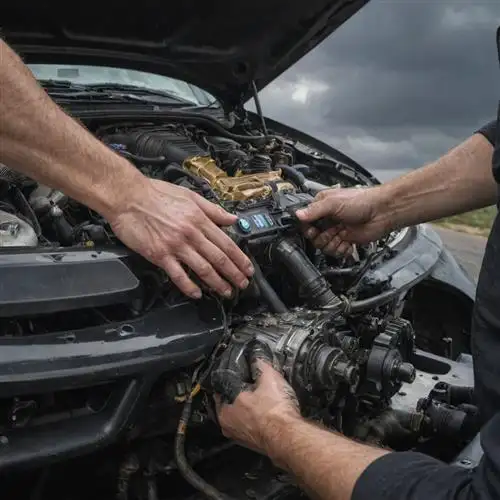
Preventive Maintenance Checklist for BMW X3
Maintaining your BMW X3 is crucial to ensure its longevity, performance, and safety. As a premium German automaker, BMW designs its vehicles to high standards, but proper care and attention are still required. Here's a comprehensive preventive maintenance checklist to help you stay on top of your X3's needs:
Oil Changes: The BMW X3 requires regular oil changes, typically every 5,000 to 10,000 miles, depending on your driving conditions and style. Use only the recommended BMW-approved engine oil to ensure optimal lubrication and engine protection.
Brake System Inspection: Regularly inspect your X3's brake pads, discs, and calipers for wear and tear. Ensure the braking system is functioning correctly, and replace any worn components as needed to maintain optimal braking performance.
Tire Rotation and Alignment: Rotate your tires every 5,000 to 10,000 miles to ensure even wear. Additionally, have your X3's wheel alignment checked and adjusted periodically to prevent uneven tire wear and improve handling.
Engine Air Filter Replacement: The engine air filter plays a crucial role in keeping your X3's engine running efficiently. Replace the air filter as per the manufacturer's recommended schedule, typically every 15,000 to 30,000 miles.
Cabin Air Filter Replacement: The cabin air filter helps maintain the air quality inside your X3. Replace it every 15,000 to 30,000 miles to ensure optimal cabin air filtration and comfort.
Coolant System Maintenance: The BMW X3's cooling system should be flushed and refilled with the recommended BMW-approved coolant at the intervals specified in your owner's manual. This helps prevent corrosion and ensures proper heat management.
Spark Plug Replacement: Replace the spark plugs in your X3 at the recommended intervals, typically every 30,000 to 60,000 miles. This helps maintain optimal engine performance and fuel efficiency.
Transmission Fluid Service: Have the transmission fluid in your BMW X3 changed at the intervals specified by the manufacturer, usually every 30,000 to 60,000 miles. This helps ensure the smooth operation of your vehicle's transmission.
Differential Oil Change: The rear differential in your X3 requires periodic oil changes, generally every 30,000 to 60,000 miles. Changing the differential oil helps prevent wear and tear on the gears and bearings.
Battery and Electrical System Inspection: Regularly inspect your X3's battery, terminals, and electrical connections to ensure they are in good condition. Replace the battery if necessary, and address any electrical issues promptly.
Importance of Regular Oil Changes for BMW X3
Regular oil changes are paramount for the longevity and optimal performance of your BMW X3. The engine oil in your vehicle is responsible for lubricating the various moving components, reducing friction, and preventing premature wear and tear. Neglecting oil change intervals can lead to a host of issues, including decreased fuel efficiency, increased emissions, and in severe cases, engine failure.
The BMW X3 requires high-quality synthetic oil to ensure the engine functions at its best. The recommended oil change interval for most BMW X3 models is typically between 5,000 to 10,000 miles, or 6 to 12 months, whichever comes first. However, it's essential to consult your owner's manual or speak with a certified BMW technician to determine the specific oil change schedule for your vehicle, as it may vary based on factors such as driving conditions, climate, and individual usage.
- Increased engine wear and tear: As oil degrades over time, it loses its ability to effectively lubricate the engine components, leading to increased friction and the potential for accelerated wear and tear on critical parts.
- Reduced fuel efficiency: Dirty or degraded oil can reduce engine performance, resulting in decreased fuel economy and higher fuel consumption.
- Increased emissions: Poorly maintained oil can contribute to increased emissions, which not only harms the environment but may also lead to compliance issues in areas with strict emissions regulations.
- Engine failure: In extreme cases, neglecting oil changes can result in catastrophic engine failure, leading to costly repairs or even the need for a complete engine replacement.
It's important to note that using the wrong type of oil or failing to adhere to the recommended oil change schedule can void your BMW's warranty. Therefore, it's crucial to work with a reputable BMW service center or certified technician to ensure your X3 receives the proper maintenance and care it requires.
Tire Rotation and Alignment for Optimal BMW X3 Performance
Maintaining the tires and alignment of your BMW X3 is crucial for ensuring optimal performance, handling, and longevity of your vehicle. Regular tire rotation and alignment not only improve your driving experience but also contribute to the overall safety and efficiency of your X3.
Tire Rotation: The tires on your BMW X3 undergo different levels of wear and tear depending on their position on the vehicle. Front tires typically wear faster due to the steering forces, while rear tires may experience more even wear. Rotating your tires at the recommended intervals, often every 5,000 to 7,500 miles, helps ensure even tread wear, extending the life of your tires and improving overall handling and stability.
When rotating tires, it's important to follow the specific pattern recommended by BMW. This may involve moving the front tires to the rear and the rear tires to the front, or a more complex pattern depending on the type of tires and drive system of your X3. Proper tire rotation helps maintain the intended weight distribution and helps prevent uneven wear, which can negatively impact your vehicle's performance and handling.
Wheel Alignment: The alignment of your BMW X3's wheels is crucial for maintaining optimal vehicle control, tire wear, and fuel efficiency. Over time, the alignment can become misaligned due to factors such as hitting potholes, uneven road surfaces, or normal wear and tear on suspension components.
A misaligned wheel can cause your X3 to pull to one side, resulting in uneven tire wear and decreased fuel economy. Regular wheel alignment checks, typically every 12 months or 12,000 miles, help ensure your BMW X3's wheels are properly positioned, reducing the risk of premature tire wear and improving overall handling and stability.
During a wheel alignment service, a technician will use specialized equipment to measure and adjust the various alignment angles, such as camber, caster, and toe, to the manufacturer's specifications. This ensures your X3's wheels are properly aligned, optimizing performance, handling, and tire life.
Brake System Inspection and Maintenance for BMW X3
Maintaining the brake system of your BMW X3 is crucial for ensuring your safety on the road. The brake system plays a vital role in controlling the vehicle's speed and bringing it to a complete stop. Neglecting brake maintenance can lead to costly repairs and, more importantly, compromise your driving experience and put you at risk. In this guide, we'll delve into the key aspects of brake system inspection and maintenance for the BMW X3, empowering you to keep your vehicle in top-notch condition.
The brake pads are the components that come into direct contact with the brake discs, causing friction and slowing down the vehicle. Over time, these pads wear down and need to be replaced. Regularly inspecting the brake pads is essential to ensure they are within the recommended thickness range. A qualified technician can perform this inspection and recommend the appropriate replacement interval based on your driving habits and the manufacturer's specifications.
The brake discs, also known as rotors, are the flat, circular components that the brake pads grip onto. These discs can become warped, uneven, or excessively worn, leading to vibrations, uneven braking, and reduced braking performance. During a brake system inspection, the technician will measure the disc thickness and check for any signs of wear or damage. If the discs are within the acceptable thickness range, they may be able to be resurfaced, which can extend their lifespan. However, if the discs are beyond the recommended thickness, they will need to be replaced.
The brake fluid in your BMW X3 is responsible for transmitting the hydraulic pressure from the brake pedal to the brake calipers, which then apply the brake pads to the discs. Over time, the brake fluid can become contaminated, leading to a reduction in its boiling point and, ultimately, a loss of braking performance. It's recommended to have the brake fluid flushed and replaced at the intervals specified by the manufacturer, typically every two to three years.
- The brake calipers are the components that house the brake pads and apply the necessary force to the discs. During a brake system inspection, the technician will check the calipers for proper operation, ensuring they are sliding smoothly and not sticking.
- If the calipers are not functioning correctly, they may need to be rebuilt or replaced to ensure even and consistent braking performance.
Modern BMW X3 models are equipped with various brake system sensors, such as brake pad wear sensors and brake fluid level sensors. These sensors provide crucial information to the vehicle's computer, allowing it to monitor the condition of the brake system and alert the driver of any issues. During a comprehensive brake system inspection, the technician will check the functionality of these sensors and ensure they are providing accurate data.
Cooling System Upkeep: Keeping the BMW X3 Running Cool
Maintaining the cooling system of your BMW X3 is crucial for its longevity and peak performance. The cooling system plays a vital role in regulating the engine temperature, preventing overheating, and ensuring efficient operation. As an owner, it's essential to understand the importance of regular cooling system maintenance and the steps involved in keeping your X3 running at its best.
Firstly, it's vital to keep a close eye on the coolant level in your BMW X3. The coolant, a mixture of water and anti-freeze, circulates through the engine block, cylinder heads, and radiator, absorbing heat and dissipating it. Regularly check the coolant level, ensuring it remains within the recommended range as specified in your owner's manual. If the level is low, refill it with the appropriate coolant type, taking care not to overfill the system.
Equally important is the condition of the coolant itself. Over time, the coolant can become contaminated, lose its anti-corrosive properties, or break down. It's recommended to have the coolant flushed and replaced at the intervals suggested by BMW. This ensures the cooling system remains efficient and protects the engine components from potential damage caused by deteriorated coolant.
Inspecting the cooling system's hoses and belts is another crucial aspect of maintenance. The hoses carry the coolant to and from the engine, while the belts drive the water pump, which circulates the coolant. Look for any signs of cracking, leaks, or deterioration in these components, and replace them if necessary. Catching issues early can prevent unexpected breakdowns and costly repairs.
The radiator, the heart of the cooling system, should also be checked regularly. Ensure the radiator fins are clean and unobstructed, allowing for optimal airflow and heat dissipation. If the radiator appears damaged or is not functioning as it should, have it inspected by a qualified technician and replace it if needed.
Finally, consider the condition of the water pump, which is responsible for circulating the coolant throughout the system. If the water pump fails, it can lead to overheating and potentially severe engine damage. Pay attention to any unusual noises or signs of leakage around the water pump, and replace it according to the manufacturer's recommendations.
















